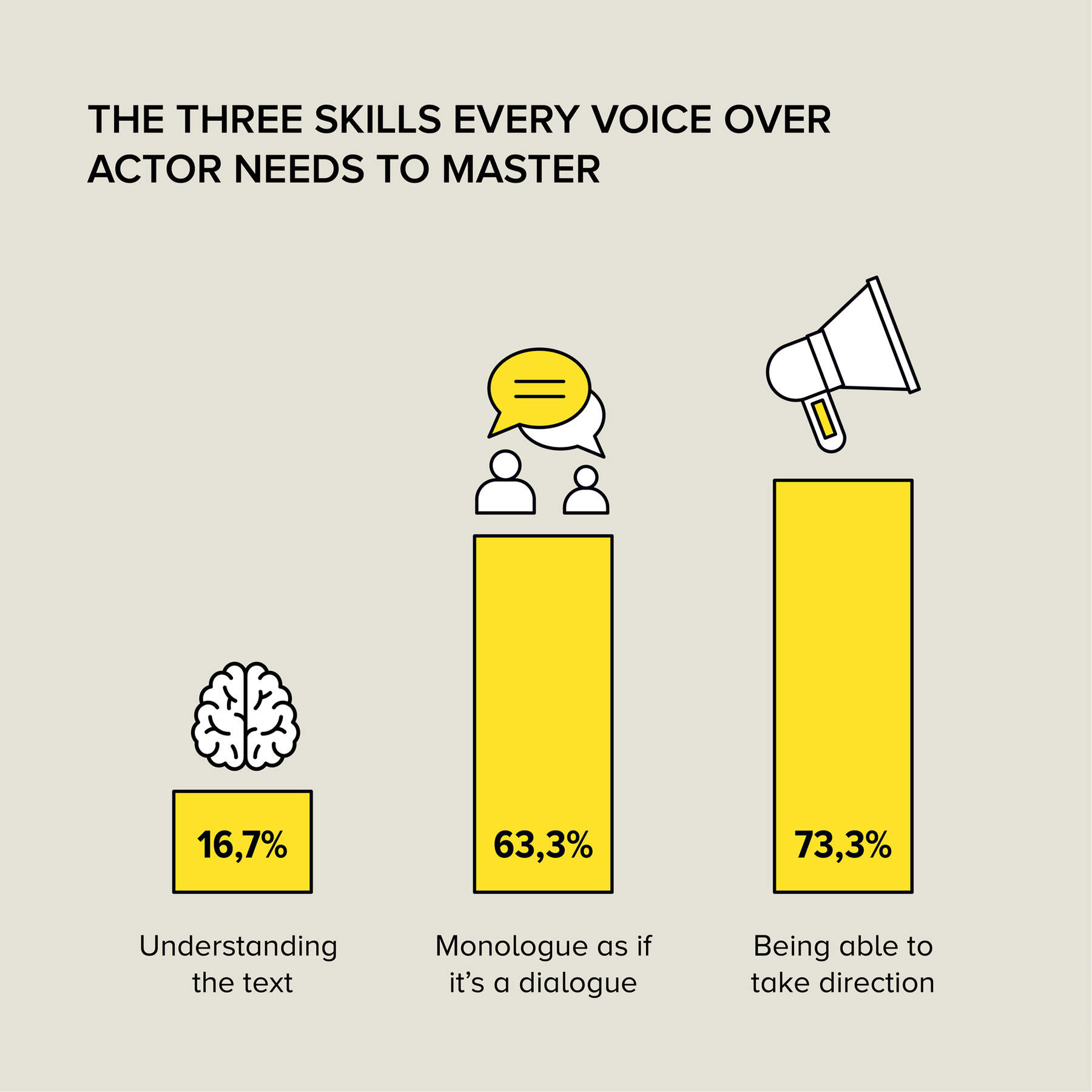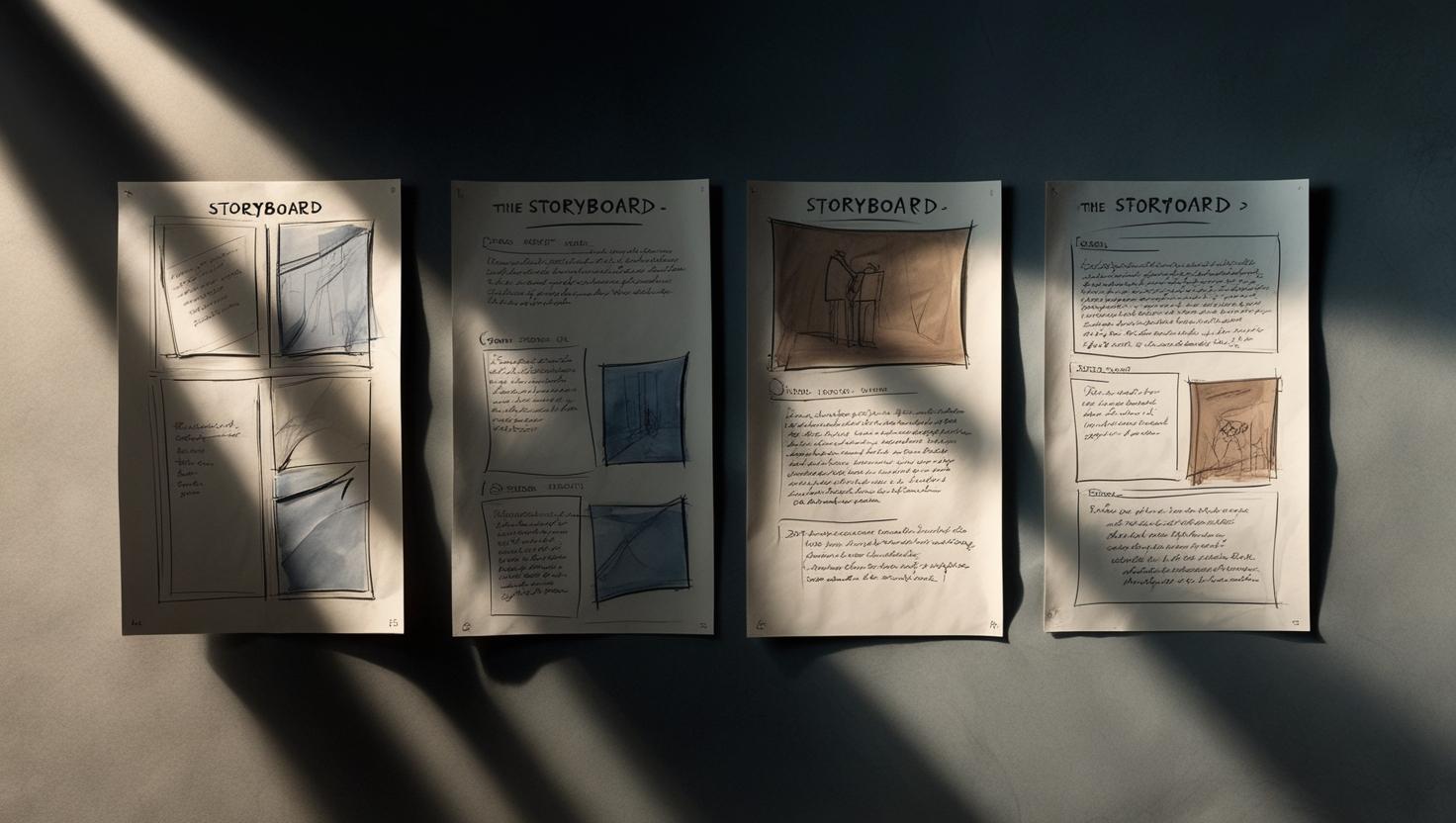It’s a question that we hear every week. ‘People say I have a lovely voice, can I become a voice over with you guys?’ Yes, to be a voice over you definitely need a lovely voice. However, there’s a lot more to it than that. But what exactly? We asked 120 top voice over artists, from both home and abroad, for their answers.
Understanding the script
As you can see from the infographic above, understanding the script is the third most common answer. It seems a very logical and perhaps obvious point. Everyone who’s had at least some secondary level schooling can understand a script, right? Yes and no. As a voice over you are paid to understand a script so well that you know exactly where to place emphasis; you know why one sentence needs to be delivered quickly and why another really shouldn’t be; when to add emotion to a line and when you need to leave that up to the listener.
Adding spontaneity
Do you know the one about the voice over who was in the recording studio for an hour and a half just to record three lines? Keep laughing. Even if the client goes for take 2. 🙂
It starts of course with the fact that as a voice over actor you’re working in a pretty unnatural situation. Try then, to be spontaneous. Try from a completely silent (home) studio to sound as if you are walking down the busy Albert Cuypmarkt. As if you are sitting between colleagues in an office. As if you’re a shopkeeper, or the parent of a child. That doesn’t just require a beautiful voice, but also a good amount of empathy and acting ability.
It works like that with rappers too. Jay-Z recently admitted that he sometimes wrestles with a text for a month. Still he manages to record his raps as if he just pulled them out of his pocket. It comes across as spontaneous. But then, under pressure. It’s a bit like that.
Master the script
The script that you need to work with as voice over, can sometimes be tricky. For example, you may be confronted with wooly written language that isn’t always appropriate for reading aloud. It says for instance: ‘The cause of this is to be found in the increasing severity of the traffic.’ Whereas in real life, you would say: ‘That’s because the roads are getting busier.’
Sentences can be too long, or not work in terms of timing. It’s your job to pull out your box of tricks and to magically turn all this into a rock solid delivery for the voice over recording.
As a voice over you can of course make suggestions here and there for how you might formulate things differently. But, let’s not confuse that with the ‘voice over artists’ who during the recording spend most of the time whining about the quality of the script. Often they are just using this as a means to cover up their lack of experience.
Delivering a monologues as if it’s dialogue
Another skill mentioned by 63.3% of our respondent voice overs has to do with dialogue. When I was just starting out in voice work, I was once in a studio with a director who said something very noteworthy: ‘In your demo I heard clips where you spoke to me as if I was really there, now I have the feeling you’re talking to a brick wall. Go back to the demo.’
Point taken. Learnt a lot from that.
By really working your way into a text and so understanding who it is you’re talking to, you can really bring that text to life. Even if the script is perhaps not actually written as a dialogue. In this way you can make people really feel you are talking directly to them. A good dose of X factor, authority or personality in your voice will definitely help with this. A slightly unusual voice can also help sometimes.
A good voice over can take direction
And then, in the number 1 spot, according to 73.3% of the questioned voice overs: as a voice over you must be able to take direction.
The voice overs responding told us that you need to have every conceivable emotion at the ready. From funny to mysterious to serious. And everything in between. Handy for directions such as: ‘it can be funny, but it still needs to be believable.’
Or just imagine: you have an A4 with at least 250 words in front of you and after 2 takes the director says: ‘Yeah, great, but you need to add emphasis here, and there, and there, and there; but absolutely not there, and it could be a little bit quicker, except for that one sentence there. Oh, yeah, and a bit happier please.’ Got it?! Go!
Or what do you think of these: ‘Can it be a bit more persuasive?’ or ‘Try to make it sound a little more self-explanatory’ or ‘Perhaps more in the way Morgan Freeman would say it.’ It is your job to ask the right questions and search out what they mean. And above all, not to get flummoxed by all the commentary.
In addition you have the sound engineer, the writer and the client who all have their own idea of how the voice should sound. A simple recording can therefore take a long time before everyone is content with it and a consensus is achieved. It is your role to take all the instructions on board, every now and then to chuck one of them overboard and yet still remain consistent.
It is no surprise that the results of our questionnaire indicated that the readiness to take direction is the single most important quality you need to have as a voice over. Well, OK, after having a lovely voice perhaps. But on the other hand, there are plenty of lovely voices in the world. So, maybe it really is about having these skills?
Thanks to all the voice over artists for your input!
What to look for in a voice over who works remotely? We have all the tricks and tips ready for you in one ebook.




